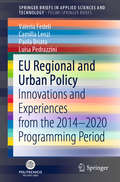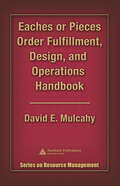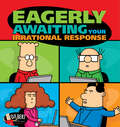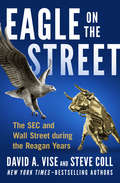- Table View
- List View
EU Migration Management and the Social Purpose of European Integration: The Spillover of Misery (IMISCOE Research Series)
by Harald Köpping AthanasopoulosThis book provides a critical analysis of irregular migration to Europe from a neo-Gramscian perspective. It demonstrates how the contemporary EU migration management regime came about within the context of a neoliberal hegemonic project, which in turn was advanced using neofunctionalist methods of integration. Relying on field research that was carried out in Bulgaria, Italy, Germany and Greece, the book also describes how European migration management is experienced by irregular migrants themselves. It suggests that the social purpose of migration management cannot be understood without assessing the experiences of the objects of migration regimes. The 2015 migration crisis revealed that large-scale migration has the potential to undermine some of the greatest achievements of the European integration project such as the Schengen system and open internal borders. This book shows that this fragility is the result of inherent contradictions within the neoliberal hegemonic project for the European Union. As such this book is an interesting read for academics, students, policy makers and all those working in international migration and European integration.
EU Payments Integration
by Ruth WandhöferAn inside view of the forces which shaped SEPA and the PSD written from the unique perspective of someone closely involved throughout the process. It uncovers the strategic, legal and practical implications of the full harmonization agenda and provides an assessment of where these initiatives stand today, including key lessons learned.
EU Prospectus Law
by Pierre SchammoPierre Schammo provides a detailed analysis of EU prospectus law (and the 2010 amendments to the Prospectus Directive) and assesses the new rules governing the European Securities and Markets Authority, including the case law on the delegation of powers to regulatory agencies. In a departure from previous work on securities regulation, the focus is on EU decision-making in the securities field. He examines the EU's approach to prospectus disclosure enforcement and its implementation at Member State level and breaks new ground on regulatory competition in the securities field by providing a 'law-in-context' analysis of the negotiations of the Prospectus Directive.
EU Regional and Urban Policy: Innovations and Experiences from the 2014–2020 Programming Period (SpringerBriefs in Applied Sciences and Technology)
by Valeria Fedeli Camilla Lenzi Paola Briata Luisa PedrazziniThe book critically reflects on some of the most important novelties and experimentations in the context of the European Union’s renewed urban and regional policy in the last programming period, 2014-2020. In particular, it examines four main innovations characterizing this period, which emerged as a result of the deep rethinking and reorganization of Cohesion Policy in the spirit of the place-based approach to local development, i.e. the development of the smart specialization strategy, the establishment of macro-regions, the focus on the urban dimension as a horizontal priority, and the role of social innovation in urban policy. Unlike other similar books, it analyzes the urban dimension of the reformed EU cohesion policy, especially focusing on its interplay with the regional dimension, and which has not been fully addressed to date. The book is intended for social scientists engaged in research on European issues, especially from regional and urban perspectives, policy-makers, particularly at the local level, and graduate students interested in regional and urban European matters.
EU Trade Agreements and European Integration: Commission Autonomy or Council Control? (Routledge/UACES Contemporary European Studies)
by Markus GastingerEU Trade Agreements and European Integration studies 50 bilateral trade agreements negotiated by the European Commission from 1970–2008 and how they shaped European integration. The book argues that the Commission used these trade agreements, signed primarily with countries in Asia and Latin America, to advance European integration by ensuring that they became wider in scope and institutionally deeper by establishing ‘joint bodies’ – even in the face of resistance from member states in the Council of the European Union. Drawing upon principal–agent theory to explain Commission autonomy and Council control as well as extensive archival material and other sources across six in-depth case studies, it shows that the Commission primarily relied on asymmetric information to shape trade agreements in earlier negotiations. In later negotiations, the Commission harnessed its agenda-setting power to submit agreements that the Council could only accept or reject. Overall, the book argues that these 50 trade agreements significantly impacted European integration by increasing the Commission’s external action capability, transforming it into a truly global political actor – one trade agreement at a time. This book will be of interest to scholars and students of European Union Studies and EU policy making, practitioners involved in trade and external relations, and engaged citizens in Europe and abroad, particularly in India, which is prominently featured in the book.
EU Trade-Related Measures against Illegal Fishing: Policy Diffusion and Effectiveness in Thailand and Australia (Routledge Focus on Environment and Sustainability)
by Kate Barclay Andrew M. Song Alin KadfakFocusing on the experiences of Thailand and Australia, this book examines the impact of trade-restrictive measures as related to the EU’s regulations to prevent Illegal, Unreported and Unregulated (IUU) fishing. It is widely accepted that IUU fishing is harmful, and should be stopped, but there are different approaches to tackling it. Acknowledging this, this book argues that major efforts to fight IUU fishing require careful analyses if the goal is to achieve optimal results and avoid unintended consequences. The book draws on the recent experiences of Thailand and Australia to offer an empirical examination of one increasingly prominent solution, trade-restrictive measures. With Thailand representing direct, active intervention by the EU and Australia a more indirect dispersion of policy narratives and discourses, the book provides a rounded view on how likely it is that different countries in different situations will adapt to the changing policy norms regarding IUU fishing. Understanding the reactions of countries who might be targeted, or otherwise be influenced by the policy, generates new knowledge that helps inform a more effective and scalable implementation of the policy on the part of the EU and a better governance preparedness on the part of non-EU fishing nations. In broader terms, this book exposes a key moment of change in the compatibility between environmental regulations and international trade. The EU IUU policy is a prime example of a policy that uses the mechanisms of international trade to account for environmental and conservation objectives. By way of the unilateral and trade-restrictive stance against IUU fishing, the EU has positioned itself as a major market and normative power, driving its sustainability norms outwards. This book sheds light on the efficacy of this policy setup based on the analysis of country perspectives, which is a key factor influencing its potential spread. This book will be of interest to students and scholars of international fisheries politics, marine conservation, environmental policy and international trade, and will also be of interest to policymakers working in these areas.
EU Verdict Against Microsoft
by David B. Yoffie Michael SlindIn 2004, following an investigation that began in 1998, the European Commission (EC) issued an antitrust judgment against Microsoft Corp., levying a record fine of 497 million euros ($613 million) and mandating changes of commercial behavior and bundling of Windows Media Player with Microsoft's Windows operating system. Summarizes the EC's ruling and Microsoft's response to it, places that ruling in the context of U.S. Government antitrust action against Microsoft, and describes Microsoft's efforts to comply with the ruling. Also covers Microsoft's appeal of the ruling, which was heard in a European court in April 2006, and outlines further EC scrutiny of Microsoft.
EU Waste Regulation in a Linear-Circular Economy Transition: Waste Management in Italy (SpringerBriefs in Environmental Science)
by Massimiliano Agovino Gaetano MusellaWaste management is a topical issue worldwide. In recent years, several requests have been made by citizens and associations to political decision-makers regarding the need for a significant improvement in waste management methods. Particularly considering the significant increase in awareness of social and environmental impacts and the economic consequences of non-virtuous waste management. There is growing attention on legislation and regulation's role in the waste sector. Regulation can help companies and citizens achieve a faster, more effective, and more efficient transition from a linear economy, based on the take-make-dispose paradigm, to a circular economy, in which the potential of waste as resources and secondary raw materials is exploited. This book is set in the wake of economic literature that tackles the transition from the linear to the circular economy. It focuses on the downstream stages of the waste management process (i.e. the waste treatment phase). In this regard, it is proposed a journey through the history of European waste legislation to study the waste sector's transition dynamics from a selfish and no longer sustainable economic model based on rampant consumerism to a far-sighted sustainable model addressing the well-being of future generations. Studying the changes in European waste regulations leads us to ask ourselves the following questions: how has waste collection changed in recent years? What are the new regulatory challenges that must be addressed to achieve the objectives of a circular economy? How successful has the EU legislation been in fostering the transition from a linear to a circular economy? Finally, has the European environmental legislation sprung a convergence process among European countries towards the circular economy, or has the definition of targets fuelled the already marked differences between EU countries?
EU and US Foreign Economic Policy Responses to China: The End of Naivety (Routledge/UACES Contemporary European Studies)
by Dirk Schmidt Joachim SchildThis book examines EU and US bilateral trade and investment relations with China, their attempts to level the economic playing field and to narrow the ‘reciprocity gap’ in market openness. It explores the extent of EU and US policy change, the underlying factors accounting for this change and compares EU and US foreign economic policy answers to an adversary increasingly perceived as an unfair economic competitor and as a systemic rival. The book covers a broad range of policy areas from ‘trade wars’, trade defense instruments, their reform and use, investment screening, and export control to industrial policies. It makes eclectic use of different strands of International Relations, International Political Economy and Policy Analysis theorizing to account for the extent of, and differences in, the EU and US responses. The People’s Republic of China’s stellar economic and political rise combined with the resilience of its unfair trade practices, its reinforced authoritarian repression at home and its ever more assertive foreign (economic) policy has triggered a shift in perceptions of China, followed by equally profound policy change in the European Union and the US. This book expertly charts and explains this significant shift in stance. This book will be of key interest to scholars, students and practitioners in the fields of EU trade policymaking, US foreign/ foreign economic policy, EU-China-US economic relations, European political economy, and more broadly to European studies, Asian studies, International Relations, International Political Economy, and transatlantic relations.
EU-Datenschutz-Grundverordnung (DSGVO)
by Paul Voigt Axel von dem BusscheDieses Praktikerhandbuch enthält Hinweise zur praktischen Umsetzung der EU-Datenschutz-Grundverordnung (DSGVO) sowie eine systematische Analyse der neuen Vorschriften. Das Handbuch widmet sich unter anderem den organisatorischen und materiellen Datenschutzanforderungen, den Rechten der betroffenen Personen, der Rolle der Aufsichtsbehörden, der Rechtsdurchsetzung und den Bußgeldern nach der Verordnung, sowie nationalen Besonderheiten. Das deutsche Datenschutz-Anpassungs- und Umsetzungsgesetz EU (DSAnpUG-EU) wurde bereits umfassend berücksichtigt. Zusätzlich gewährt das Handbuch einen kompakten Überblick zu den Konsequenzen der Neuregelung für ausgewählte Verarbeitungssituationen mit hoher Praxisrelevanz, wie Cloud Computing, Big Data und Internet of Things. Die im Jahr 2016 verabschiedete DSGVO tritt im Mai 2018 in Kraft. Sie sieht zahlreiche neue bzw. verstärkte Datenschutzpflichten sowie eine deutliche Erhöhung der Bußgelder (auf bis zu 20 Mio. Euro) vor. Nicht nur in der Europäischen Union ansässige Unternehmen werden daher ihre Datenschutz-Compliance auf den Prüfstand stellen müssen; aufgrund des weiten, grenzüberschreitenden Anwendungsbereichs der Verordnung wird ihr Inkrafttreten Auswirkungen auf zahlreiche Unternehmen weltweit haben.
EU-Datenschutz-Grundverordnung (DSGVO): Praktikerhandbuch
by Paul Voigt Axel von dem BusscheDieses Praktikerhandbuch gibt einen praxisnahen Überblick über die Vorgaben der DSGVO und das deutsche Datenschutzrecht. Das Handbuch widmet sich unter anderem den organisatorischen und materiellen Datenschutzanforderungen, den Rechten der betroffenen Personen, der Rolle der Aufsichtsbehörden, den Schadensersatzanspüchen und den Bußgeldern nach der Verordnung, sowie deutschen nationalen Besonderheiten. Es enthält zahlreiche Praxishinweise und Anwendungsbeispiele sowie eine kompakte Übersicht zu den datenschutzrechtlichen Vorgaben für ausgewählte Verarbeitungssituationen mit hoher Praxisrelevanz, wie Cloud Computing, Big Data und Künstliche Intelligenz. Das Handbuch wurde für die zweite Auflage vollständig überarbeitet und berücksichtigt umfangreich neue datenschutzrechtliche Rechtsprechung und Behördenstellungnahmen.
EU-MERCOSUR Interregionalism: Diplomatic and Trade Relations (United Nations University Series on Regionalism #21)
by Mario Torres Jarrín Lourdes Gabriela Daza AramayoThis book focuses on EU-MERCOSUR relations from a diplomatic and trade perspective against the background of the political agreement between the two in 2019. The authors take into consideration that EU-MERCOSUR cooperation developed during recent decades has tried, on the one hand, to build a strategic partnership to respond to the main challenges of international agendas and, on the other, to incorporate in Latin American countries the European new vision of transatlantic regionalism. Starting from a historical perspective of the development of interregionalism between the EU and MERCOSUR, the book goes on to study the geopolitical impacts of Brexit, stagnation of the EU-USA relationship, the COVID-19 pandemic, and of new geopolitical players in EU-LAC interregionalism. It discusses the legal institutional framework of the EU-MERCOSUR relations and provides a comparative view of features of MERCOSUR countries vis-à-vis the European Union. The book also analyses and provides a comprehensive overview of various aspects of interregional trade in the context of the 2019 agreement. Highly topical and authored by experts in this field, this book is of interest to a wide readership in the social sciences and economics: from political sociology to international relations, diplomacy studies and international trade.
EU-Russia Energy Relations: A Discursive Approach
by Lukáš TichýThis book explores the timely topic of energy security and international relations between the European Union and the Russian Federation. Pursuing a constructivist-discursive approach, it empirically analyses a corpus of energy discourses involving policymakers and representatives of the EU and the Russian Federation. Exploring various discursive meanings assigned to the material and technical character of EU-Russian energy relations, the monograph underscores how the identities and interests of both parties are strongly affected by the norms and values which frame the individual energy discourses.
EURO Working Group on DSS: A Tour of the DSS Developments Over the Last 30 Years (Integrated Series in Information Systems)
by Pascale Zaraté Jason Papathanasiou Jorge Freire de SousaThis book recapitulates the major developments in Decision Support Systems (DSS) over the last 30 years in order to evaluate the research areas of decision making and in which direction the field should proceed. As it attempts to find a consensus about the next steps for the future of DSS research, the book also enforces the trends and new technologies currently in use. The book examines topics such as decision analysis for enterprise systems and non-hierarchical networks, integrated solutions for decision support and knowledge management in distributed environments, decision support system evaluation and analysis through social networks, and e-learning and its application to real environments. It clearly presents the evidence to support their cases and attempts to promote an extensive and objective discussion. In addition, the book also reflects on approaches to dead-end ideas and failures in DSS to better understand the lessons learned. The contributions for this book have been written by thought leaders and influential researchers from the EURO Working Group of Decision Support Systems (EWG-DSS).
EViews Guide for Introductory Econometrics for Finance
by Chris BrooksThis free software guide for EViews with freely downloadable datasets brings the econometric techniques to life, showing readers how to implement the approaches presented in Introductory Econometrics for Finance using this highly popular software package. Designed to be used alongside the main textbook, the guide will give readers the confidence and skills to estimate and interpret their own models while the textbook will ensure that they have a thorough understanding of the conceptual underpinnings.
EXPERIMENTAL POVERTY MEASURES: Summary of a Workshop
by National Research Council of the National AcademiesA summary of Experimental Poverty Measures
EY Tax Guide 2016
by Ernst Young LlpMaximize your 2016 tax return EY Tax Guide 2016 turns filing your taxes into a simple process. While tax code is admittedly complex, this trusted guide offers specific solutions for tax payers, including homeowners, self-employed entrepreneurs, business executives, and senior citizens, to help you zero in on the best tax strategy for your financial situation. Green tips offer updated insight into environmental credits for green initiatives that can maximize your return. Additionally, this authoritative text provides at-a-glance reference sheets for key subject areas, including changes in tax law, common errors to avoid, tax breaks and deductions, and more. If you find tax preparation an intimidating process you are not alone; however, you can simplify your taxes by turning to a trusted guide for support. The EY Tax Guide is an approachable yet authoritative resource that has acted as the go-to reference for individual taxpayers for years. With this text, you can understand the deductions you are entitled to and maximize your return. Explore the top tax preparation errors, increasing your return and protecting your wealth Consider tax strategies that are specific to your particular financial situation, tailoring your preparation approach to your needs Leverage money-saving tips and other useful information, such as insight regarding tax law changes and tax breaks Streamline the filing process with the tax organizer, and plot your preparation on the tax calendar to meet key deadlines EY Tax Guide 2016 is an integral resource that guides you in maximizing your tax return through trusted tax filing techniques.
EZ Occupational Outlook Handbook
by The Editors at JISTThis reader-friendly reference features engaging, one-page descriptions of nearly 260 jobs, including those in the most recent Occupational Outlook Handbook, plus new green careers.
Eaches or Pieces Order Fulfillment, Design, and Operations Handbook
by David E. MulcahyIf your business uses warehouses to deal with the sales of goods, then you know that facility operations, shipping, and customer service are important to your company's health. Eaches or Pieces Order Fulfillment, Design, and Operations Handbook offers insights for warehouse, distribution, or logistics professionals to make their "eaches or pieces"
Eagerly Awaiting Your Irrational Response: A Dilbert Book (Dilbert #48)
by Scott AdamsThe office culture in Dilbert abounds with hazards, from risky re-orgs and ergonomic ball chair disasters to Wally&’s flying toenail clippings. After a colleague suggests planning a huddle to ideate around an opportunity, Dilbert suffers an acute bout of jargon poisoning. It&’s all part of the delightful drudgery of Eagerly Awaiting Your Irrational Response.
Eagle on the Street: The SEC and Wall Street during the Reagan Years
by Steve Coll David A. ViseA &“spellbinding account&” of Wall Street deregulation in the 1980s, based on a Pulitzer Prize–winning Washington Post series (The New York Times Book Review). Described by the New York Times Book Review as &“worthy of being on the same shelf&” as Liar&’s Poker, Greed and Glory on Wall Street, and Barbarians at the Gate, this eye-opening business history explains how Washington and Wall Street cut the deals that led to a decade of greed. For the Securities and Exchange Commission, the 1980s brought sweeping changes. Under the sway of Reaganomics and the leadership of John Shad, the SEC came down hard on insider trading but introduced wide-ranging deregulation to the stock market, which helped to both fuel the legendary bull market and sow the seeds of the 1987 crash. Shad, a former vice-chairman of the brokerage firm EF Hutton & Company and the first Wall Street executive to lead the SEC since Joseph Kennedy, was a true believer in the free market. His tenure touched all the big headlines and enduring images of this tumultuous decade, from leveraged buyouts to junk bonds, Manhattan skyscrapers to Senate hearing rooms, Michael Milken to T. Boone Pickens. David A. Vise and Steve Coll won the Pulitzer Prize for the original reporting in the Washington Post that would become Eagle on the Street. In an era when the costs, benefits, and risks of deregulation are under debate once again, their &“engrossing account of the struggle for the soul of the SEC&” is essential reading (The Washington Post).
Ear Economy: China Audio Streaming Programs Study
by Ying HuangThis book sheds light on the overall description and explanation of the current socio-political, economic and cultural environment concerning the development of China's audio streaming programs industry. It interprets the emergence of the “ear economy” through the subjects of media ecology, media psychology, communication studies and cultural criticism, media industrial studies, sociology and anthropology. The book skillfully weaves together historical, cultural, and industry studies, along with textual and critical discourse analysis. This interdisciplinary work contributes to multiple academic fields including literary and cultural studies, media and communication studies, China/Asia studies, and political theory.
Earl Gordon - Eastern Circle
by Steven Rogers Greg WhiteThis case follows an entrepreneur through the process of sourcing a potential acquisition, valuing a company, and securing the funding to purchase the company. This entrepreneur must decide if he should close the deal and which financing term sheet to accept.
Earl Martin Phalen: Ready to ROAR?
by Noam Wasserman Julia TaylorEarl Martin Phalen is in the midst of starting his second non-profit organization, Summer Advantage, by implementing the lessons he learned from BELL, the non-profit he had founded and run for the prior 15 years. His aspirations for Summer Advantage were to make it "bigger, better, and faster [than BELL]. I am going to serve more children, more effectively, and for less money." In the midst of taking a very different approach to financing, staffing, and running Summer Advantage, he received an offer to become non-founding CEO of a much bigger non-profit, and is grappling with whether to take the job offer.
Early American Children’s Clothing and Textiles: Clothing a Child 1600-1800
by Carey Blackerby HansonEarly American Children’s Clothing and Textiles: Clothing a Child 1600–1800 explores the life experiences of Indigenous, Anglo-European, African, and mixed-race children in colonial America, their connections to textile production, the process of textile production, the textiles created, and the clothing they wore. The book examines the communities and social structure of early America, the progression of the colonial textile industry, and the politics surrounding textile production beginning in the 1600's, with particular focus on the tasks children were given in the development of the American textile industry. The book discusses the concept of childhood in society during this time, together with documented stories of individual children. The discussion of early American childhood and textile production is followed by extant clothing samples for both boys and girls, ranging from Upper-class children's wear to children's wear of those with more humble means. With over 180 illustrations, the book includes images of textile production tools, inventions, and practices, extant textile samples, period portraits of children, and handmade extant clothing items worn by children during this time period. Early American Children’s Clothing and Textiles: Clothing a Child 1600–1800 will be of interest to working costume designers and technicians looking for primary historical and visual information for Early American productions, costume design historians, early American historians, students of costume design, and historical re-enactment costume designers, technicians, and hobbyists.





















